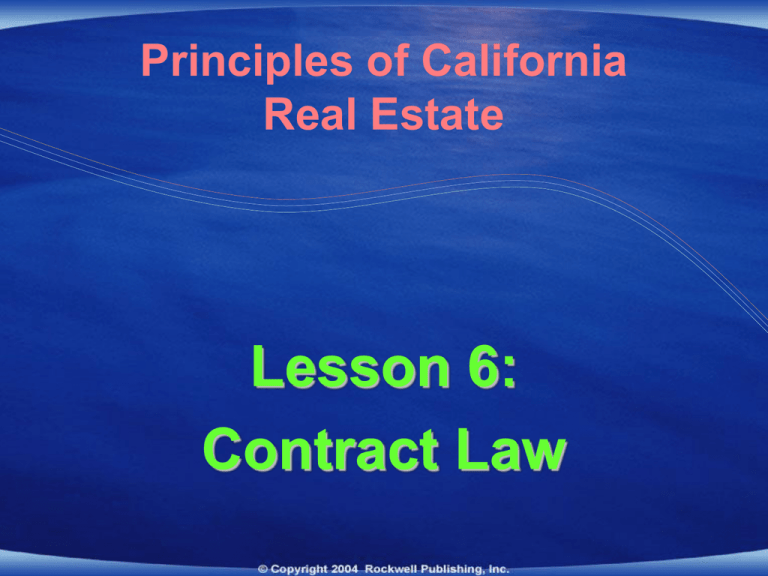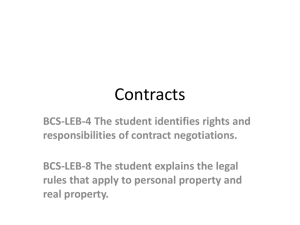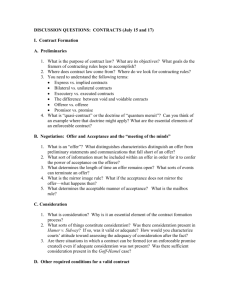Remedies for Breach of Contract
advertisement

Principles of California Real Estate Lesson 6: Contract Law Introduction Contract: An agreement between two or more persons to do, or not do, certain things. Introduction Contract: An agreement between two or more persons to do, or not do, certain things. Valid contract: A legally binding contract. Introduction Contract: An agreement between two or more persons to do, or not do, certain things. Valid contract: A legally binding contract. Valid contract will be enforced by a court if one party fails to comply with agreement. Legal Classifications of Contracts Contracts may be classified according to certain basic characteristics. Legal Classifications of Contracts Contracts may be classified according to certain basic characteristics. Every contract is: express or implied unilateral or bilateral executory or executed Legal Classifications of Contracts Express vs. implied Express contract: One that is put into words, oral or written. Legal Classifications of Contracts Express vs. implied Express contract: One that is put into words, oral or written. Implied contract: One not expressed in words, but implied by the parties’ actions. Legal Classifications of Contracts Express vs. implied Express contract: One that is put into words, oral or written. Implied contract: One not expressed in words, but implied by the parties’ actions. Most contracts are express, not implied. Legal Classifications of Contracts Unilateral vs. bilateral Unilateral contract: Only one party promises to do something and is legally obligated to perform as promised. Reward for Lost Dog! I promise to pay$$- you promise nothing- Legal Classifications of Contracts Unilateral vs. bilateral Unilateral contract: Only one party promises to do something and is legally obligated to perform as promised. Bilateral contract: Both parties promise to do something and are legally obligated to perform as promised. Legal Classifications of Contracts Unilateral vs. bilateral Unilateral contract: Only one party promises to do something and is legally obligated to perform as promised. Bilateral contract: Both parties promise to do something and are legally obligated to perform as promised. Most contracts are bilateral. Legal Classifications of Contracts Executory vs. executed Executory: Contract is in the process of being performed. Listing for three months to sell propertyUp until sale of the property it is “in process” Legal Classifications of Contracts Executory vs. executed Executory: Contract is in the process of being performed. Executed: Contract has been fully performed; both parties have fulfilled their promises. The House sold, and you paid me the commission- Legal Classifications of Contracts Executory vs. executed Executory: Contract is in the process of being performed. Executed: Contract has been fully performed; both parties have fulfilled their promises. Note that “executed” may also refer to a contract that has been signed. Summary Legal Classifications of Contracts Contract Express or implied Unilateral or bilateral Executory or executed Elements of a Valid Contract A valid contract must have: Capacity Consideration lawful objective mutual consent CCLM- say calm Elements of a Valid Contract Contractual capacity Contract is not legally binding unless all parties have legal capacity to enter into it. Elements of a Valid Contract Contractual capacity Contract is not legally binding unless all parties have legal capacity to enter into it. Two requirements for legal capacity: (1) age (2) mental competence Contractual Capacity Age of majority In California, a person must be at least 18 to enter into a contract. 18 is the age of majority. Someone under 18 is a minor. Contractual Capacity Age of majority In California, a person must be at least 18 to enter into a contract. 18 is the age of majority. Someone under 18 is a minor. Parent or legal guardian may enter into a binding contract on minor’s behalf. Contractual Capacity Age of majority Real estate contract in which one party is a minor is void. Contractual Capacity Age of majority Real estate contract in which one party is a minor is void. No legal effect. Neither party can enforce it against the other. Contractual Capacity Age of majority Real estate contract in which one party is a minor is void. No legal effect. Neither party can enforce it against the other. Other contracts (not related to real estate) signed by a minor are voidable by the minor. Contractual Capacity Age of majority Real estate contract in which one party is a minor is void. No legal effect. Neither party can enforce it against the other. Other contracts (not related to real estate) signed by a minor are voidable by the minor. Other party can’t enforce contract. Minor can enforce contract through parent or guardian if he or she wants to. Contractual Capacity Age of majority Exception: Emancipated minor may freely enter into any type of contract. Contractual Capacity Age of majority Exception: Emancipated minor may freely enter into any type of contract. Minor may be emancipated by: marriage military service court order Contractual Capacity Mental competence Mentally competent: Of sound mind. Contractual Capacity Mental competence Mentally competent: Of sound mind. If one party has been declared mentally incompetent, contract is void. Legal guardian can enter into contracts on behalf of incompetent person. Contractual Capacity Mental competence Mentally competent: Of sound mind. If one party has been declared mentally incompetent, contract is void. Legal guardian can enter into contracts on behalf of incompetent person. If someone enters into a contract while temporarily incompetent, contract may be voidable. Summary Contractual Capacity Capacity Age of majority Mental competence Guardian Elements of a Valid Contract Consideration Consideration: Each party to a contract must give the other something of value, which is called consideration. Elements of a Valid Contract Consideration Consideration: Each party to a contract must give the other something of value, which is called consideration. Money, property, services, or a promise to provide something of value in the future. Love and affection- gift to family member Elements of a Valid Contract Consideration Consideration: Each party to a contract must give the other something of value, which is called consideration. Money, property, services, or a promise to provide something of value in the future. Consideration in typical real estate sale: seller’s promise to convey title buyer’s promise to pay agreed price Elements of a Valid Contract Lawful objective If one party agrees to commit an unlawful act, a court won’t enforce contract on behalf of either party. Rule applies to any contract involving a violation of law or public policy. Elements of a Valid Contract Mutual consent Contract is legally binding only if both parties have consented to its terms. Elements of a Valid Contract Mutual consent Contract is legally binding only if both parties have consented to its terms. Mutual consent arrived at through offer and acceptance: Elements of a Valid Contract Mutual consent Contract is legally binding only if both parties have consented to its terms. Mutual consent arrived at through offer and acceptance: Offeror makes offer to offeree. If offeree accepts offer, contract is formed. Mutual Consent Offer and acceptance Offer must : express an intention to enter into a contract be definite and certain Mutual Consent Offer and acceptance Offer must : express an intention to enter into a contract be definite and certain To be “definite and certain,” offer must specify basic contract terms. Mutual Consent Offer and acceptance Offer must : express an intention to enter into a contract be definite and certain To be “definite and certain,” offer must specify basic contract terms. Vague offer is illusory. If accepted, contract is unenforceable. Offer and Acceptance Termination of an offer Offer terminates if before acceptance: offeror revokes offer too much time passes offeror dies or is declared insane offeree rejects offer offeree makes counteroffer Offer and Acceptance Termination of an offer Offer terminates if before acceptance: offeror revokes offer too much time passes offeror dies or is declared insane offeree rejects offer offeree makes counteroffer If offer terminates before it is accepted, no contract is formed. Termination of an Offer Revocation Offeror can revoke offer any time before acceptance. Offeror must notify offeree of revocation before acceptance. Termination of an Offer Revocation Offeror can revoke offer any time before acceptance. Offeror must notify offeree of revocation before acceptance. Even if offer was supposed to remain open until a particular date, offeror can revoke it before that date arrives. Termination of an Offer Lapse of time Offer that states deadline for acceptance expires automatically when that date or time arrives. Termination of an Offer Lapse of time Offer that states deadline for acceptance expires automatically when that date or time arrives. Offer without deadline expires after a reasonable amount of time has passed. Termination of an Offer Lapse of time Offer that states deadline for acceptance expires automatically when that date or time arrives. Offer without deadline expires after a reasonable amount of time has passed. “Reasonable” depends on circumstances. Issue sometimes decided by court. Termination of an Offer Death or insanity If offeror dies before offer is accepted, offer is terminated and no contract is formed. Termination of an Offer Death or insanity If offeror dies before offer is accepted, offer is terminated and no contract is formed. If a court determines offeror is mentally incompetent, offer is terminated. Termination of an Offer Rejection by offeree Rejection terminates offer. After rejecting offer, offeree can’t simply change mind and accept it. Termination of an Offer Rejection by offeree Rejection terminates offer. After rejecting offer, offeree can’t simply change mind and accept it. Contract will be formed only if offeror still wants to proceed. Termination of an Offer Counteroffer Counteroffer: When offeree agrees to some terms of original offer, but changes one or more other terms. Termination of an Offer Counteroffer Counteroffer: When offeree agrees to some terms of original offer, but changes one or more other terms. Although sometimes called a qualified acceptance, a counteroffer has the legal effect of a rejection. Termination of an Offer Counteroffer Counteroffer: When offeree agrees to some terms of original offer, but changes one or more other terms. Although sometimes called a qualified acceptance, a counteroffer has the legal effect of a rejection. Counteroffer terminates original offer and replaces it with new offer. Offer and Acceptance Communication of acceptance To create binding contract, offeree must communicate acceptance to offeror before offer terminates. Offer and Acceptance Communication of acceptance To create binding contract, offeree must communicate acceptance to offeror before offer terminates. Offer may specify how acceptance must be communicated. Offer and Acceptance Communication of acceptance To create binding contract, offeree must communicate acceptance to offeror before offer terminates. Offer may specify how acceptance must be communicated. If no time or manner of acceptance is stated in offer, a reasonable time and manner is implied. Negative Forces Affecting Consent Acceptance must be freely given. Negative Forces Affecting Consent Acceptance must be freely given. Contract voidable by victimized party if he or she can show consent resulted from: fraud undue influence duress Negative Forces Affecting Consent Fraud Fraud: Misrepresenting a material fact to someone who relies on the misinformation. Negative Forces Affecting Consent Fraud Fraud: Misrepresenting a material fact to someone who relies on the misinformation. Material fact: Important information that could affect offeree’s decision to enter into contract. Negative Forces Affecting Consent Fraud Fraud: Misrepresenting a material fact to someone who relies on the misinformation. Material fact: Important information that could affect offeree’s decision to enter into contract. Fraud is either actual or constructive. Negative Forces Affecting Consent Fraud Actual fraud: Person making misrepresentation knows or should know that it’s false. Negative Forces Affecting Consent Fraud Actual fraud: Person making misrepresentation knows or should know that it’s false. Intentional deceit. Statements made without knowing whether they’re true. Negative Forces Affecting Consent Fraud Actual fraud: Person making misrepresentation knows or should know that it’s false. Intentional deceit. Statements made without knowing whether they’re true. Constructive fraud: Person in a position of trust or with superior knowledge unintentionally misleads other person. Negative Forces Affecting Consent Fraud It isn’t necessary to actually make misleading statements to commit fraud. Negative Forces Affecting Consent Fraud It isn’t necessary to actually make misleading statements to commit fraud. Simply concealing a material fact may be fraud. Concealment of a material fact is sometimes called negative fraud. Negative Forces Affecting Consent Undue influence Undue influence: Persuading someone to sign contract by taking advantage of trust, weakness of mind, or distress. Negative Forces Affecting Consent Undue influence Undue influence: Persuading someone to sign contract by taking advantage of trust, weakness of mind, or distress. Persuasion strong enough to overpower will, so that consent isn’t truly voluntary. Negative Forces Affecting Consent Undue influence Undue influence: Persuading someone to sign contract by taking advantage of trust, weakness of mind, or distress. Persuasion strong enough to overpower will, so that consent isn’t truly voluntary. May involve abuse of special legal relationship based on trust: broker-seller, attorney-client, etc. Negative Forces Affecting Consent Duress Duress: One party uses physical confinement, violence, or threat of confinement or violence to force other party to sign. Negative Forces Affecting Consent Law presumes consent Other party can enforce contract unless it can be proved in court that fraud, undue influence, or duress was involved. Negative Forces Affecting Consent Law presumes consent Someone who signs contract without reading it is not excused from performance. Party who can’t read should always ask someone he trusts to read it for him. Negative Forces Affecting Consent Law presumes consent Someone who signs contract without reading it is not excused from performance. Party who can’t read should always ask someone he trusts to read it for him. Party who doesn’t know language should always ask someone she trusts to translate. Elements of a Valid Contract Statute of frauds The statute of frauds is a state law that requires some types of contracts to be: in writing, and signed. Statute of Frauds Which contracts must be in writing California’s statute of frauds applies to any agreement: 1. that is not to be performed within one year Statute of Frauds Which contracts must be in writing California’s statute of frauds applies to any agreement: 1. that is not to be performed within one year 2. for sale or exchange of real estate (e.g., purchase and sale agreement) Statute of Frauds Which contracts must be in writing California’s statute of frauds applies to any agreement: 1. that is not to be performed within one year 2. for sale or exchange of real estate (e.g., purchase and sale agreement) 3. For leasing real estate, if it will expire more than one year after it is entered into (e.g., 13-month lease) Statute of Frauds Which contracts must be in writing 4. authorizing agent to purchase or sell real estate (power of attorney) Statute of Frauds Which contracts must be in writing 4. authorizing agent to purchase or sell real estate (power of attorney) 5. authorizing agent to find buyer or seller for real estate, if agent will receive compensation (listing agreement) Statute of Frauds Which contracts must be in writing 4. authorizing agent to purchase or sell real estate (power of attorney) 5. authorizing agent to find buyer or seller for real estate, if agent will receive compensation (listing agreement) 6. for assumption of a mortgage or deed of trust Statute of Frauds Which contracts must be in writing All other contracts are not covered by statute of frauds and need not be in writing. Statute of Frauds Which contracts must be in writing All other contracts are not covered by statute of frauds and need not be in writing. Examples: lease expiring in less than one year contract for the sale of personal property Statute of Frauds Status of contract that doesn’t comply A contract subject to the statute of frauds is unenforceable if it: isn’t in writing, or isn’t signed by the party to be bound (the one who’s being sued). Statute of Frauds Status of contract that doesn’t comply A contract subject to the statute of frauds is unenforceable if it: isn’t in writing, or isn’t signed by the party to be bound (the one who’s being sued). But once the contract has been fully performed, neither party can undo the transaction based on the statute of frauds. Statute of Frauds Adequate written contract To fulfill statute of frauds, any “writing” is adequate if: it identifies contract subject matter, indicates agreement between parties, and is signed by the party to be bound. Statute of Frauds Adequate written contract To fulfill statute of frauds, any “writing” is adequate if: it identifies contract subject matter, indicates agreement between parties, and is signed by the party to be bound. May be printed, handwritten, or a combination. If conflict between printed and handwritten parts, handwritten part takes precedence. Summary Mutual Consent and Other Required Elements Mutual consent Termination of offer Counteroffer Fraud, undue influence, duress Lawful objective Consideration Statute of frauds Legal Status of Contracts Terms indicating to what extent a contract is legally binding: void voidable unenforceable valid Legal Status of Contracts Void Void contract: no legal effect whatsoever. Legal Status of Contracts Void Void contract: no legal effect whatsoever. Parties are in same position they’d be in if they had not attempted to make a contract. Legal Status of Contracts Void Void contract: no legal effect whatsoever. Parties are in same position they’d be in if they had not attempted to make a contract. Contract can be disregarded. Neither party needs to withdraw, because there’s nothing to withdraw from. Legal Status of Contracts Void A contract that doesn’t fulfill one of the basic requirements may be void. Legal Status of Contracts Void A contract that doesn’t fulfill one of the basic requirements may be void. Examples: no consideration exchanged party is mentally incompetent minor is party to real estate contract objective is unlawful party’s signature is forged Legal Status of Contracts Voidable If contract is voidable: One party can choose whether to withdraw or go through with the contract. Contract unenforceable by other party. Legal Status of Contracts Voidable If contract is voidable: One party can choose whether to withdraw or go through with the contract. Contract unenforceable by other party. Examples: non-real estate contract entered into by a minor (voidable by minor or guardian) contract entered into as a result of fraud, undue influence, or duress Legal Status of Contracts Voidable Voidable contract is binding unless party asks court to rescind contract. Legal Status of Contracts Voidable Voidable contract is binding unless party asks court to rescind contract. Withdrawing party must take legal action within reasonable time. Otherwise, court may rule that contract has been ratified. Legal Status of Contracts Unenforceable Contract is classified as unenforceable if its contents can’t be proved in court. Legal Status of Contracts Unenforceable Contract is classified as unenforceable if its contents can’t be proved in court. Often a problem with unwritten contracts. Or if written contract is too vaguely worded and parties can’t prove what they intended, court will refuse to enforce it. Legal Status of Contracts Unenforceable Contract also unenforceable if statute of limitations missed. Legal Status of Contracts Unenforceable Contract also unenforceable if statute of limitations missed. Statute of limitations sets time limit for filing a lawsuit. Party who misses applicable deadline loses right to sue. Legal Status of Contracts Unenforceable Contract also unenforceable if statute of limitations missed. Statute of limitations sets time limit for filing a lawsuit. Party who misses applicable deadline loses right to sue. California statute of limitations for contracts: Breach of written contract: 4 years Breach of oral contract: 2 years Legal Status of Contracts Unenforceable Court may also bar legal claim under doctrine of laches. Legal principle that allows court to decide there’s been an undue delay in asserting the claim. Legal Status of Contracts Unenforceable Court may also bar legal claim under doctrine of laches. Legal principle that allows court to decide there’s been an undue delay in asserting the claim. Different from statute of limitations, which sets specific deadline for filing claim. Legal Status of Contracts Valid Contract is valid if: it meets all requirements for forming a contract, its contents can be proved in court, and statute of limitations hasn’t run out. Legal Status of Contracts Valid Contract is valid if: it meets all requirements for forming a contract, its contents can be proved in court, and statute of limitations hasn’t run out. If one party fails to perform as promised, other can sue to have contract enforced. Summary Legal Status of Contracts Void Voidable Unenforceable Valid Discharging a Contract Most contracts are discharged by full performance: Each party performs as promised. Contractual relationship ends. Discharging a Contract Most contracts are discharged by full performance: Each party performs as promised. Contractual relationship ends. May be discharged without full performance, if parties agree to: rescission cancellation assignment novation Discharging a Contract Rescission Rescission: Parties agree to terminate contract and undo any steps already taken to perform. Discharging a Contract Rescission Rescission: Parties agree to terminate contract and undo any steps already taken to perform. If either party has paid the party other money or given any property, it’s returned. Discharging a Contract Rescission Rescission: Parties agree to terminate contract and undo any steps already taken to perform. If either party has paid the party other money or given any property, it’s returned. Parties put themselves back in positions they were in before contract was formed, as if contract never happened. Discharging a Contract Cancellation Cancellation: Parties agree to terminate contract without undoing whatever steps they’ve already taken. Discharging a Contract Cancellation Cancellation: Parties agree to terminate contract without undoing whatever steps they’ve already taken. If money has changed hands, party who received it is allowed to keep it. Discharging a Contract Assignment Assignment: One party withdraws and has someone else take his place. Original party (assignor) assigns his interest in contract to new party (assignee). Discharging a Contract Assignment Assignment: One party withdraws and has someone else take his place. Original party (assignor) assigns his interest in contract to new party (assignee). Assignor remains secondarily liable. Contract not really discharged. If assignee defaults, other party can still sue assignor. Discharging a Contract Assignment General rule: one party can assign her interest without other party’s permission, unless contract has clause expressly forbidding assignment. Discharging a Contract Assignment General rule: one party can assign her interest without other party’s permission, unless contract has clause expressly forbidding assignment. Exception: Contract specific to one person, such as hazard insurance policy, typically can’t be assigned. Discharging a Contract Novation Novation: Original party withdraws and is replaced by new party, and also is released from further liability. Discharging a Contract Novation Novation: Original party withdraws and is replaced by new party, and also is released from further liability. Always requires consent of the other original party. Discharging a Contract Novation Novation: Original party withdraws and is replaced by new party, and also is released from further liability. Always requires consent of the other original party. Novation can also refer to substitution of new agreement for old agreement, between same parties. Summary Discharging a Contract Discharge Full performance Rescission Cancellation Assignment Novation Remedies for Breach of Contract Breach of contract: When one party doesn’t perform as agreed, without discharging contract and without legal excuse. Remedies for Breach of Contract Breach of contract: When one party doesn’t perform as agreed, without discharging contract and without legal excuse. If one party breaches contract, other party has the right to sue. Remedies for Breach of Contract Four legal remedies for breach of contract: rescission damages liquidated damages specific performance Remedies for Breach of Contract Rescission As explained earlier, in rescission the contract ends and any steps taken to carry it out are undone. Remedies for Breach of Contract Rescission As explained earlier, in rescission the contract ends and any steps taken to carry it out are undone. Parties are put back in their pre-contract positions. Remedies for Breach of Contract Rescission As explained earlier, in rescission the contract ends and any steps taken to carry it out are undone. Parties are put back in their pre-contract positions. Rescission may be: result of agreement between parties, or court-ordered remedy for breach of contract. Remedies for Breach of Contract Damages Damages: An amount of money a court orders breaching party to pay other party. Remedies for Breach of Contract Damages Damages: An amount of money a court orders breaching party to pay other party. Compensates non-breaching party for losses resulting from breach. Most common remedy for breach of contract. Remedies for Breach of Contract Liquidated damages Liquidated damages: Remedy that parties may agree to in advance, by including provision in contract. Remedies for Breach of Contract Liquidated damages Liquidated damages: Remedy that parties may agree to in advance, by including provision in contract. If one party breaches, other party is entitled to specified sum of money (the liquidated damages). Remedies for Breach of Contract Liquidated damages Liquidated damages: Remedy that parties may agree to in advance, by including provision in contract. If one party breaches, other party is entitled to specified sum of money (the liquidated damages). The liquidated damages are the other party’s only remedy; can’t sue for more. Remedies for Breach of Contract Liquidated damages In residential deposit receipt, parties usually agree to treat good faith deposit as liquidated damages if buyer defaults. Remedies for Breach of Contract Liquidated damages In residential deposit receipt, parties usually agree to treat good faith deposit as liquidated damages if buyer defaults. California has special rules that apply in this context, which are explained in next lesson. Remedies for Breach of Contract Specific performance Specific performance: Court orders breaching party to carry out contract. Remedies for Breach of Contract Specific performance Specific performance: Court orders breaching party to carry out contract. Sometimes damages aren’t enough to compensate for breach of contract. Non-breaching party wants to make other party fulfill promise. Remedies for Breach of Contract Specific performance Specific performance not always granted. Court may decide damages award is adequate compensation. Remedies for Breach of Contract Specific performance Specific performance not always granted. Court may decide damages award is adequate compensation. General rule: Specific performance only awarded if subject of contract is unique. Remedies for Breach of Contract Specific performance Specific performance not always granted. Court may decide damages award is adequate compensation. General rule: Specific performance only awarded if subject of contract is unique. Damages award won’t enable buyer to obtain replacement if none exists. Court may be willing to grant specific performance to real estate buyer. Breach of Contract Tender offer To be entitled to sue for breach of contract, non-breaching party must be ready to carry out his side of the bargain. Breach of Contract Tender offer To be entitled to sue for breach of contract, non-breaching party must be ready to carry out his side of the bargain. Before filing lawsuit, non-breaching party is usually required to make a tender: unconditional offer to perform as agreed. Tender Offer Anticipatory repudiation Anticipatory repudiation: One party repudiates contract by making definite statement that she is not going to perform as agreed. Tender Offer Anticipatory repudiation Anticipatory repudiation: One party repudiates contract by making definite statement that she is not going to perform as agreed. If anticipatory repudiation occurs, other party can sue without making a tender. Summary Remedies for Breach of Contract Rescission Damages Liquidated damages Specific performance Tender offer





